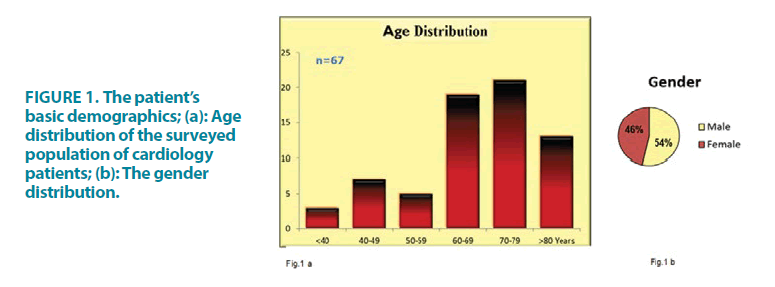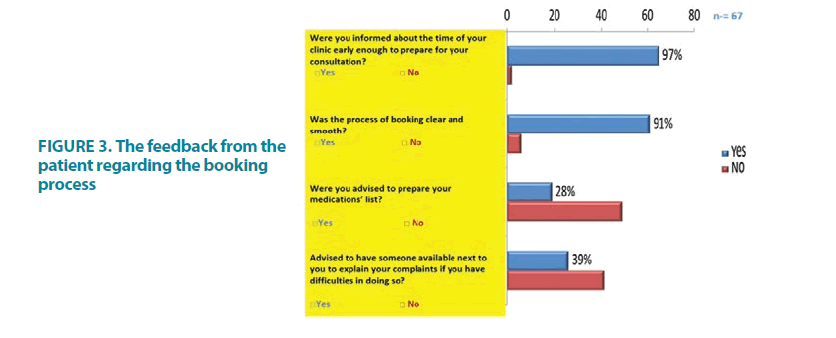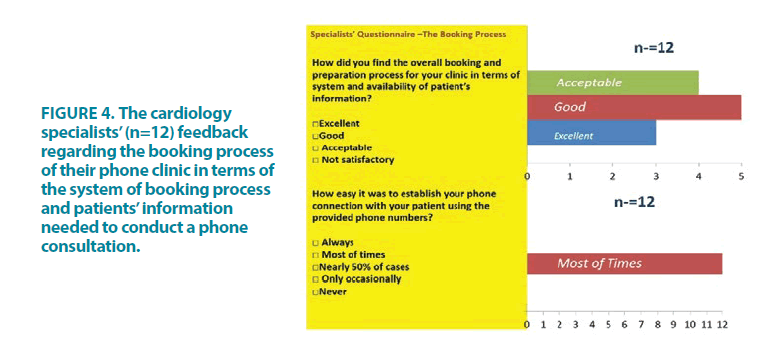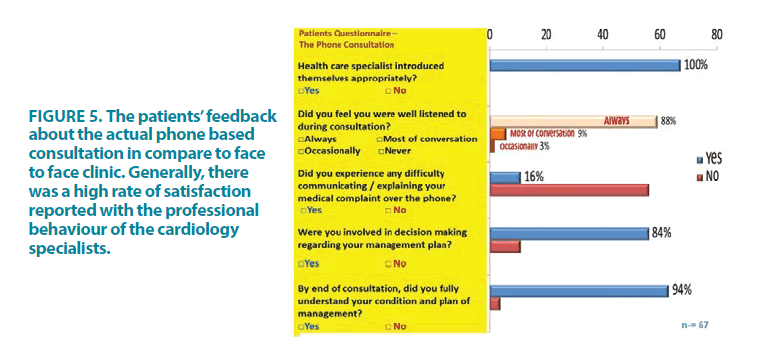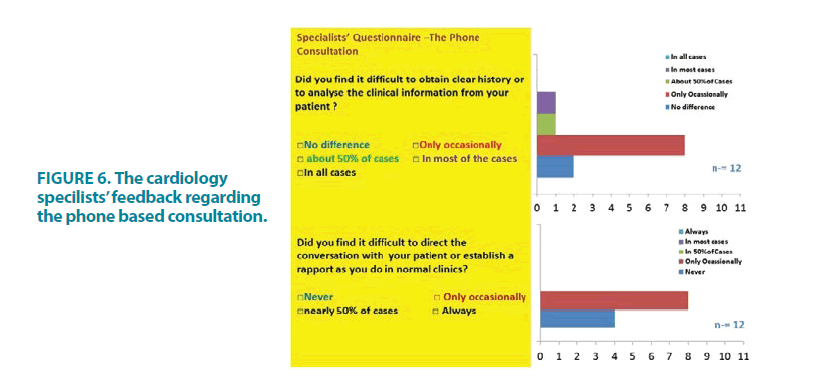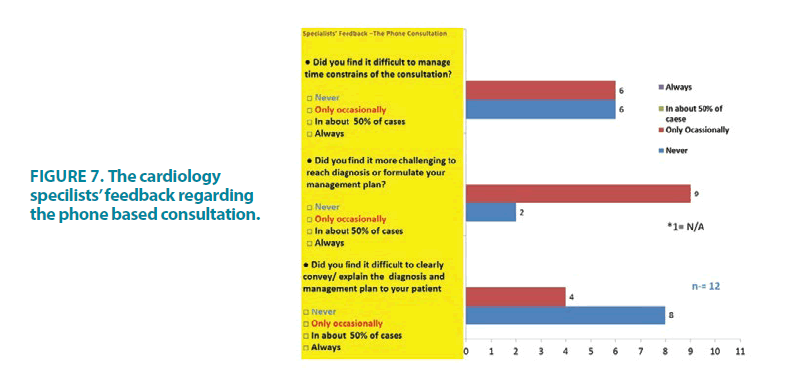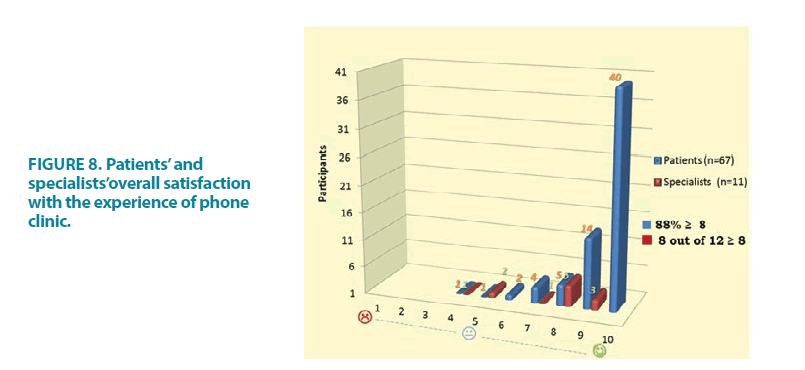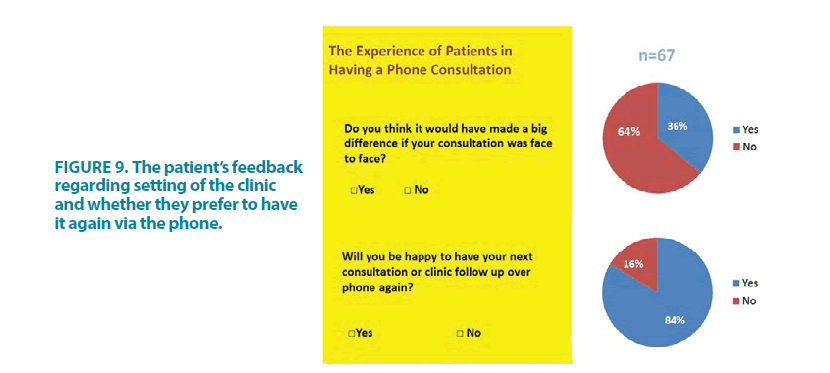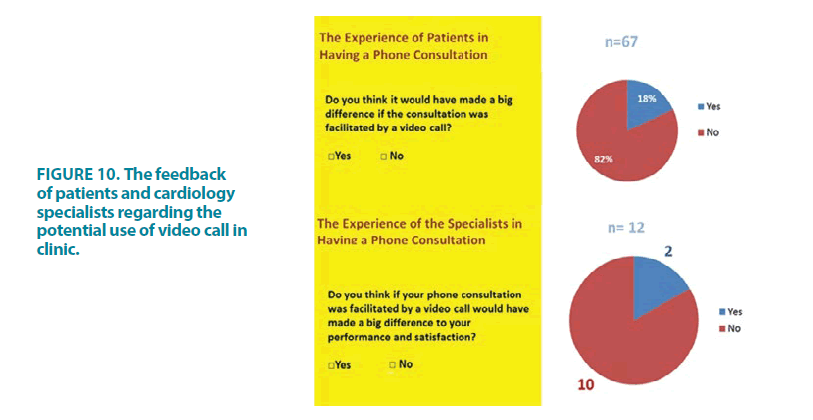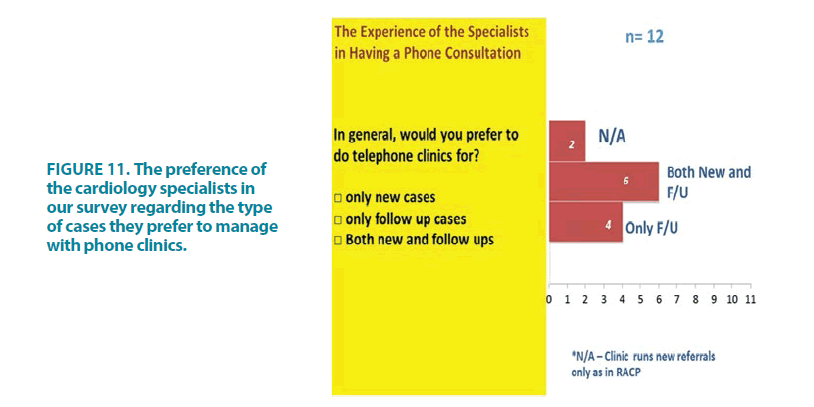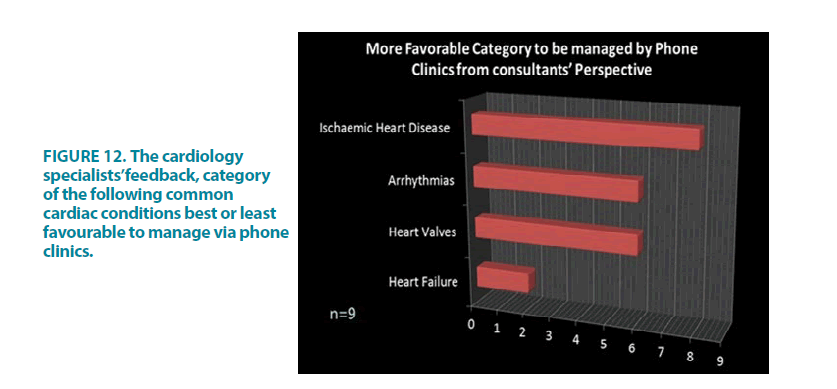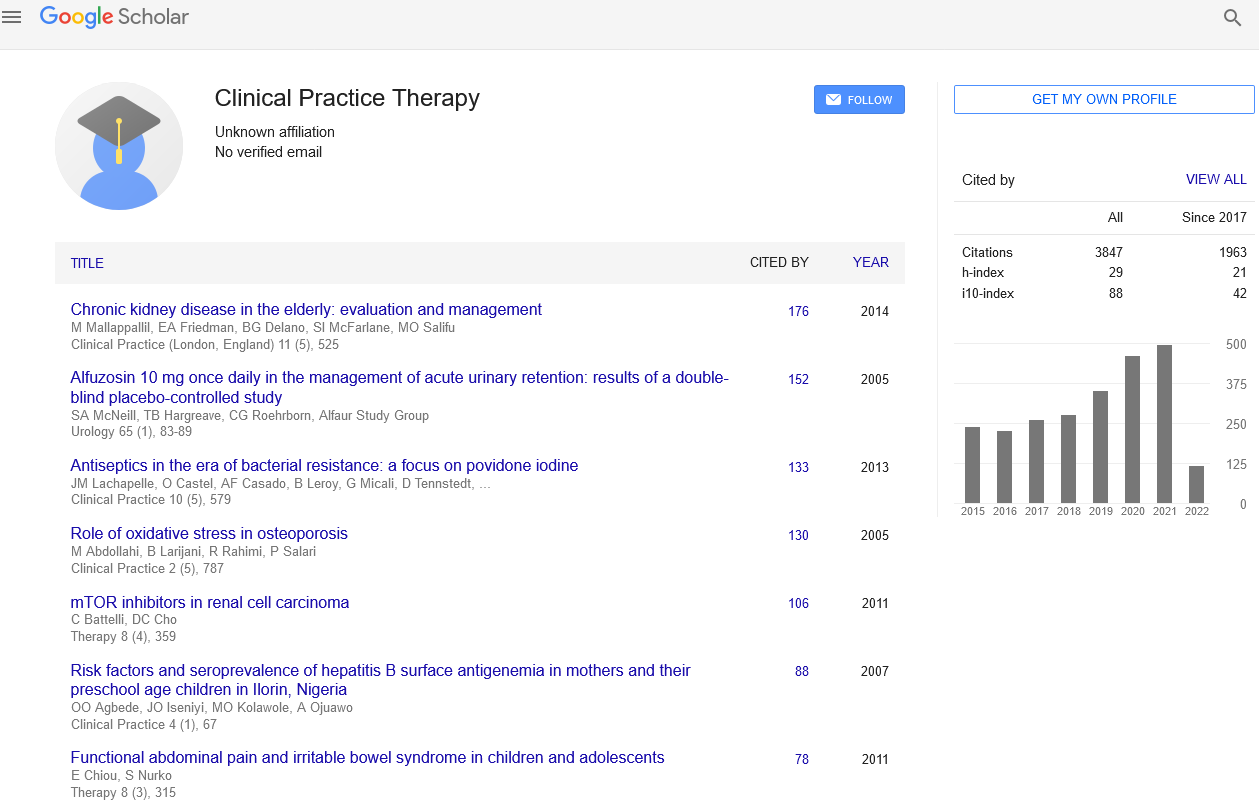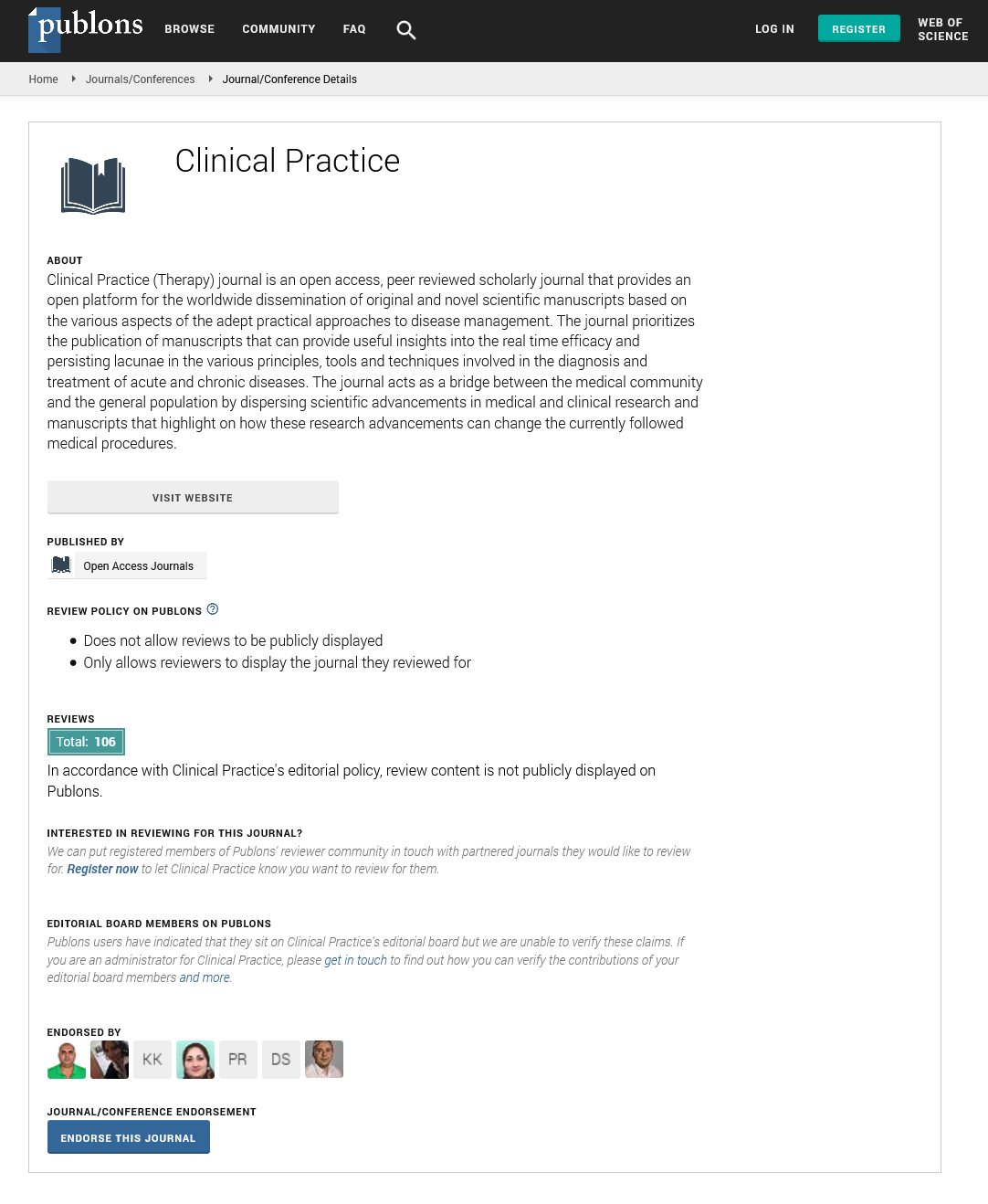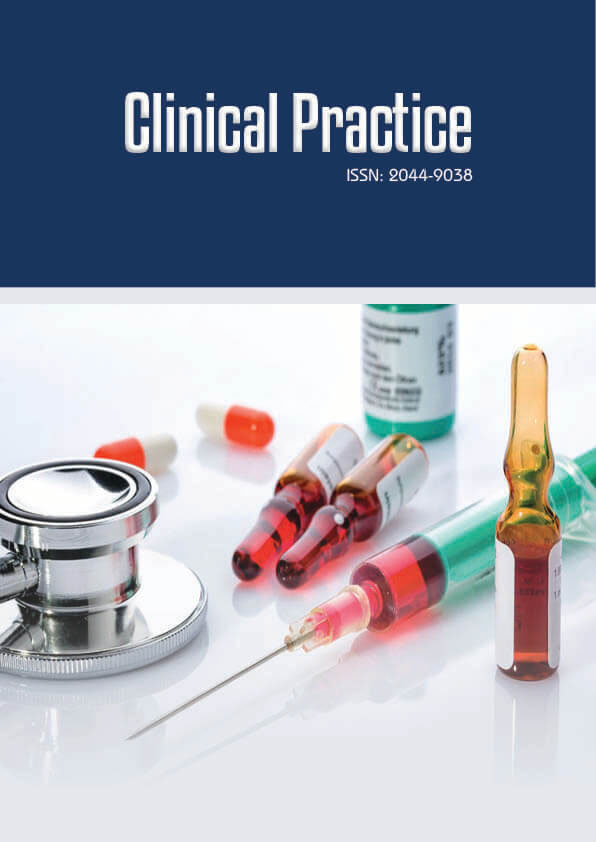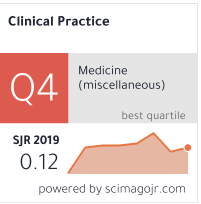Review Article - Clinical Practice (2021) Volume 18, Issue 4
Cardiology Phone Clinics in a Regional Centre during COVID-19 Pandemic: The Patients and Clinicians Experience (An Audit Survey)
- Corresponding Author:
- Milad Hassoon Interventional Cardiology Fellow at North Wales Cardiac Centre, UK E-mail: miladhassoon@gmail.com
Abstract
COVID 19 pandemic imposed a challenge on sustaining a safe outpatient cardiology service. The phone clinics become widely used alternative to provide the cardiac consultations and follow up services. We aimed at evaluating this experience from the patients and cardiology specialists’ point of view and gage their satisfaction with this setting. Method: A survey audit utilised structured questionnaires-based feedback from patients and cardiology specialists involved in phone clinics at a regional cardiac centre. Results: The feedbacks of 67 patients and 12 cardiology specialists involved in 12 telephone clinics over a period of 14 days were collected. The survey showed that more than 80% of patients and consultants’ were satisfied with the adopted booking process, the quality of service and overall outcome of phone clinic experience. The survey suggested minor communication challenges and occasional performance related challenges faced by the specialists who conducted these clinics. The survey also explored a trend in preferences of the type of cases managed in these clinics where ischaemic heart disease is more favourable and heart failure cases are the least. Conclusion: Cardiology phone clinics are well received mode of remote consultation and follow up among the patients and cardiology professionals.
Keywords
telephone clinics, covid, cardiology outpatients
Key messages
1. Telephone clinic setting is a well-received mode of service provision by cardiology patients and Cardiology specialists
2. Minor communication difficulties reported but did not affect the overall positive experience
3. A well organised booking process contribute positively to the patients experience
4. There is a suggestion that follow up cases and ischaemic heart disease cases are more suitable for telephone clinics
Introduction
During COVID-19 Pandemic, the strict social distancing measures in one hand and the pressing need to continue the outpatient cardiology service provision on the other, resulted in fast tracking phone based clinics as a mode of remote speciality consultation service.
Worldwide, the remote clinics practices become popular and the term Telemedicine has been widely applied at a larger scale than known before [1,2].
Cardiology is a fine subspecialty that intuitively relies on the patient-clinician face to face interaction just like most other aspects of medicine.
Previous studies prior to the pandemic, such as VOCAL study [3,4], looked at remote ways of delivering medical consultations via video software applications, such as Skype®, and concluded its safety and convenience however only in a well selected group of patients that represented a small fraction of clinics load.
Prior to the pandemic, our locality which is covered by North Wales Cardiac Centre, Rhyl, Wales-United Kingdom, the cardiology department used to run about 98 outpatient cardiology clinics per month which were conducted by a full team of cardiology specialist of variable grades. Following the COVID-19 pandemic and after the 31st of March 2020, the department started officially telephone- based outpatient cardiology clinics.
The number of telephone clinics organised grew up quickly to reach about 74 clinics per week despite the lower number of specialists available to run the outpatient service due to the redeployment of work force in our region to cope with the pandemic. The direct outpatient review of any cardiology case was very occasional depending on the particular case needs, and therefore the Telephone clinics become the main platform to provide the service.
Aim and Objectives
The purpose of this survey was to assess the patient’s and specialists’ experiences of telephone clinics that cardiology department conducted during the period of COVID-19 lockdown.
It aims at exploring the patients’ feedback in context of the setting of these clinics, the satisfaction with outcome, and potential shortcomings or advantages compared to face- face clinics.
It also gathered the feedback of the cardiologists and specialist nurses, who conduct these clinics, will be referred to as “The Cardiology Specialists” in the text of this study, using comparable questions to those asked to their patients.
Because it is fundamental that any health service should aim for perfect satisfaction of the patients and clinicians with any setting of the service provision; therefore this audit survey is evaluating this service against such an ideal target.
In our centre the booking process for the phone clinics is organised by our outpatient clinics booking department after receiving the patient list from cardiology department. The booking office sends postal notifications of the proposed clinics time and date, as well as contacting the patients on their available contact numbers to confirm the attendance using the preferred contact number. Those patients whom were not reachable using existing phone numbers based on their records will still be sent a letter that asked them to call back and confirm they are happy with the arrangements and they will remain on the clinic lists.
Methodology
Questionnaires were used to obtain the feedback of patients and cardiology specialists. One questionnaire was sent to the patients and another for the cardiology specialists who run the phone clinics. The two questionnaires consisted of specific questions, generally comparable and covered three areas in relation to the experience:
• The booking process
• The actual phone-based consultation
• The overall impression about the experience of the phone clinic in compare to face-face clinic
We selected the patients who were listed for 12 clinics between 26th June 2020 and 9th July 2020. The total number of patients was 82. The clinics were conducted by 12 cardiology specialists, included 9 consultant cardiologists and 3 cardiology specialist nurses.
The patients’ questionnaires were sent to the listed patients prior to their appointment with a note that they will receive a phone call by the audit team to obtain their answers over the phone if they were happy to participate. This method of collection was chosen instead of the classic postal collection to minimise any unnecessary effort by the patient to leave their houses during the lockdown. It also gave the opportunity for the patient to ask any clarification for any question that seemed unclear on the questionnaire form. The questionnaires were sent in both English and Welsh languages. Two members of audit team, not involved in telephone clinic service provision, called the patients at least one day following the appointment and collected the patient answers to the questions listed on the questionnaire. To overcome any potential bias, standardised answers were provided by the audit team for any patient who asked for explanation regarding any specific questionnaire item. Verbal consents were obtained from all participants.
A Separate questionnaire was distributed among the cardiology specialists (consultant cardiologists and specialist nurses) who conducted the clinics. The data were collected and documented electronically in a spread sheet by the principle auditor and analysed anonymously.
The data were represented in bar and pie charts. Percentage representation used for the patients data given their adequate number. Whilst the specialists’ related data were represented as abstract numbers to avoid the false impression that percentages give when used in a small number of subjects.
Results
The questionnaire based feedback of 67 patients was obtained. Three patients refused to participate and 12 patients were not contactable. This represented a response rate of 82% which is 3-4 times higher than the average response rate to the hospital’s routine postal-based surveys ran in the past by the local service quality monitoring team. All our specialists participated in this survey.
◼ The patients basic demographics
The age distribution of the surveyed patients were as expected for those with cardiac related issues, the vast majority were above 60 years old FIGURE 1a. No major difference in gender distribution FIGURE 1b.
Figure 1: The patient’s basic demographics; (a): Age distribution of the surveyed population of cardiology patients; (b): The gender distribution.
◼ Cardiology clinic appointment category
The proportion of new cases seen was not significantly different from follow ups among the surveyed patients, FIGURE 2a. The vast majority of the cases (79%) were assessed by cardiology consultants in general cardiology clinics and the remaining were attended by cardiology specialist nurses in heart failure chest pain clinics, FIGURE 2b.
Figure 2: Cardiology clinic appointment category; (a): Showing the proportion of the new versus follow up cases among the surveyed patients; (b): Represent the percentage of cases assigned to general cardiology, heart failure and chest pain clinics.
◼ The patients feedback regarding the booking process
We asked the patients four questions about the booking process and whether they received the appropriate advice to prepare for it FIGURE 3.
More than 90% were informed early enough to prepare for the clinic and found the booking process clear and smooth. Only 28% were advised to prepare medication list and 38% were advised/asked to have the assistance of other person to help them explain their complaints if they were unable to do so.
The cardiology specialists were also asked about their opinion of the booking process and the preparation for the clinic, FIGURE 4. Eight out of 12 specialists rated the booking process good to excellent. The specialists managed to establish contact with their patients and to do the phone clinic using the data base of contact numbers provided in most of the time.
◼ The patients’ and cardiology specialists’feedback regarding the phone consultation
The patients were asked questions to examine their satisfaction with professional manners and communication of the cardiology specialists who contacted them as well as their understanding and involvement in their management plan FIGURE 5.
There was high rate of satisfaction reported with in all aspects. A small percentage of patients (16%) reported difficulties at level of communication.
The cardiology specialist conducted the phone clinics were asked a group of questions to examine their experience in terms of communication with the patients, managing time and formulating a management plan FIGURE 6 and FIGURE 7.
Eight out of 12 reported occasional difficulty in communication and establishing a rapport. Six out of 12 found it “occasionally difficult” to manage time constrains. Nine out of 12 found it occasionally difficult to reach a diagnosis whilst 4 out of 12 found it occasionally difficult to convey their plan of management or to explain the diagnosis to the their patients.
◼ Overall satisfaction score
We asked the patients and cardiology specialists to rate their satisfaction with the whole experience of phone clinic in scale of 0 to 10 FIGURE 8.
Out of 67 patients, 40 patients rated the experience at 10 and 14 rated it at 9. Generally, 88% rated the experience at 8 or above.
Eight out of 12 specialists scored their satisfaction as ≥ 8/10. However, 3 specialists rated the experience at 5 and below.
◼ Feedback on the experience
We asked the patients if a face to face consultation would have made a big difference to their experience and whether they would have been happy to have a phone clinic again in future FIGURE 10. A 36% thought face to face clinic would have made a big difference and 84% were happy to have phone clinic again.
The patients and cardiology specialists were asked specifically if a video facilitated call would have made the phone based clinic much different FIGURE 11.
Figure 11: The preference of the cardiology specialists in our survey regarding the type of cases they prefer to manage with phone clinics.
An 82% of the patients and 10 out of 12 specialists did not think a video facility would have made a big difference to their experience.
We asked the cardiology specialists who conducted the clinics about which type of cases they would prefer to manage via phone clinics, whether new or follow up cases FIGURE 12.
Out of the ten specialists who could manage both types, 6 thought that phone clinics are suitable to manage both new and follow up cases whilst 4 specialists preferred follow up cases only.
◼ The free text feedback
We gathered variable free text feedback from the specialists who conducted the clinics; the following are the trends in their comments (Mentioned by 2 or more specialists):
• The phone clinic is less time consuming
• Phone clinics are convenient for both cardiology specialist and the patients in terms of the choice of time and place
• The patients were particularly satisfied with needlessness of public or private transport use
• The ability to accommodate more patients in telephone clinics than face to face clinics
We also asked our specialist to comment on which category of the following cardiac conditions, ischemia heart disease/coronary related issues, heart failure, arrhythmias or valves pathologies they think is best or least favourable for you to manage via phone clinics.
8 out of 9 consultants think that Ischaemic heart disease related cases are more favourable, while only 2 consultants out of 9, thought heart failure cases were favourable.
Discussion
We explored the feedback of a sample of cardiology patients and their corresponding cardiology specialist regarding their experience of having clinic consultations via the phone during the COVID pandemic. Up to our knowledge this is the first of kind to target this cohort. The survey was comprehensive in addressing different aspects of the process from initial booking, the actual consultation and finally to the reflection on the whole experience.
The booking process that our centre adapted gained the satisfaction of 92% of our patients. There was no particular systematic pitfall in the process which could be identified to account for the 8% of negative feedback.
The survey revealed that about two third of our patients were not pre-informed or advised during the booking process of the importance of having medications lists in hand during the clinic. The same applied to the importance of to having a relative or partner to help them if they need to have assistance in their communication. These points probably did not result in a reported significant disruption to clinic consultation of this sample of patients; however, it would have been very likely a reported source of disruption if a larger sample of patients was surveyed.
The feedbacks regarding the booking process from our cardiology consultants and specialists nurses were positive, where 2/3 reported a good to excellent experience.
A 16% of the audited patients experienced a difficulty to communicate their medical complaints. However, that did not affect the eventual high rate of positive patients’feedbacks (94%-100%) regarding way they interacted with the cardiology specialists in terms of communication, performance and clarity of outcome. This was consistent with the patients experience in studies that tacked virtual clinics performance [5,6]. However, the patient contact numbers availability or accuracy is an occasional concern expressed by our specialists that needs to be addressed by improving our data base.
8 out of 12 specialists reported that “only occasionally” the phone consultation represents a challenge in obtaining a history, reaching a diagnosis or formulating a management plan. This was constantly reported by the specialist nurses, which is quite understandable given that specialist nurses deal with cases within a defined scope of skills they possess in compare to the consultant cardiologists who are trained to deal with a wider scope of conditions.
Eight out of 12 Specialists reported “only occasional” difficulty in directing the conversation over the phone. Probably this was due to the novelty of this practice and the shift from the classical face to face interaction.
The overall satisfaction score (0-10) with phone clinics was high among both patients and cardiology specialists surveyed, 88% of patients and 8 out of 12 scored it ≥ 8/10. This overall patients’ satisfaction has been reported in similar experiences during COVID pandemic among different cohort of patients [7].
A 36% of the patients thought that having the clinic face to face would have made a big difference to their experiences. However, still an 84% of the patients were happy to have their clinic appointment again on the phone. This is again a reflection to satisfaction with over all experience and an indicator that this setting could be utilised in future.
The surveyed patients were positive about the convenience of the clinics and unnecessity to use means of transport to attend an appointment, which was also observed by another study that assessed virtual clinics [8].
More than 80% of the audited patients did not think a video call would make a big difference to their experience. And the same applied to our cardiology specialists where 10 out of 12 shared the same view. However, we think this should be interpreted with caution since the factor of familiarity/availability of video call set or software and internet services was not particularly addressed here especially given the mean age of this cohort such challenge was identified in telemedicine practice during COVID 19 [9,10].
Nearly a half of our consultants prefer phone clinics for follow up appointments rather than for new referrals. Probably the availability of baseline investigation and a track of previous results is a factor that makes it easier to formulate a clear management plan.
Generally, ischaemia and heart valves related issues are more favourable category of cases for our consultants to manage on the phone. Heart failure cases seem to be the least favourable. It is very likely, the need for physical examination to determine severity of the case plays a big role in this category of patients which is a factor identified in previous observational study [11].
Limitations
The results of our survey might be limited by a concise sample; however we believe that gaging satisfaction in such a sample is still informative regardless to its size.
The collection of the questionnaire answers was via calling the patients rather than anonymous paper feedback which might make some patients less comfortable, however, that actually secured high response rate and in many occasions encouraged the patients to take part in this survey and the phone call was made after many days of sending the original questionnaire and the process was merely collection ticked boxes.
The survey targeted a group of cardiology patients, and their experience might not be generalised to that of other specialties.
Conclusions
Conducting phone clinics in cardiology during the pandemic has gained a positive feedback from the patients and the cardiology specialists. It is a convenient and well received mode of remote speciality consultation service and could be utilised routinely.
Acknowledgement
Many thanks to Ms Jacque Casson for her participation in data collection.
Conflict of Interest
No conflict of interests.
Funding
No funding to declare.
References
- Hollander JE, Carr BG. Virtually perfect? Telemedicine for Covid-19. N Engl J Med. 382, 1679-1681 (2020).
- Fisk M, Livingstone A, Pit SW. Telehealth in the Context of COVID-19: Changing perspectives in Australia, the United Kingdom, and the United States. J Med Internet Res. 22, e19264 (2020).
- Shaw S, Wherton J, Vijayaraghavan S, et al. Advantages and limitations of virtual online consultations in a NHS acute trust: the VOCAL mixed-methods study. Southampton (UK): NIHR Journals Library. (2018).
- Greenhalgh T, Shaw S, Wherton J, et al. Real-World implementation of video outpatient consultations at macro, meso, and micro levels: Mixed-method study. J Med Internet Res. 20, e150 (2018).
- Fatehi F, Martin-Khan M, Smith AC, et al. Patient satisfaction with video teleconsultation in a virtual diabetes outreach clinic. Diabetes Technol Ther. 17, 43-48 (2015).
- Alharbi KG, Aldosari MN, Alhassan AM, et al. Patient satisfaction with virtual clinic during Coronavirus disease (COVID-19) pandemic in primary healthcare, Riyadh, Saudi Arabia. J Family Community Med. 28, 48-54 (2021).
- Serper M, Nunes F, Ahmad N, et al. Positive early patient and clinician experience with telemedicine in an academic gastroenterology practice during the COVID-19 pandemic. Gastroenterology. 159, 1589-1591 (2020).
- Curtis A, Parwaiz H, Winkworth C, et al. Remote clinics during coronavirus disease 2019: lessons for a sustainable future. Cureus. 13, e14114 (2021).
- Rodriguez JA, Betancourt JR, Sequist TD, et al. Differences in the use of telephone and video telemedicine visits during the COVID-19 pandemic. Am J Manag Care. 27, 21-26 (2021).
- Gilbert AW, Billany JCT, Adam R, et al. Rapid implementation of virtual clinics due to COVID-19: report and early evaluation of a quality improvement initiative. BMJ Open Quality. 9, e000985 (2020).
- Shaw SE, Seuren LM, Wherton J, et al. Video consultations between patients and clinicians in diabetes, cancer, and heart failure services: linguistic ethnographic study of video-mediated interaction. J Med Internet Res. 22, e18378 (2020).
